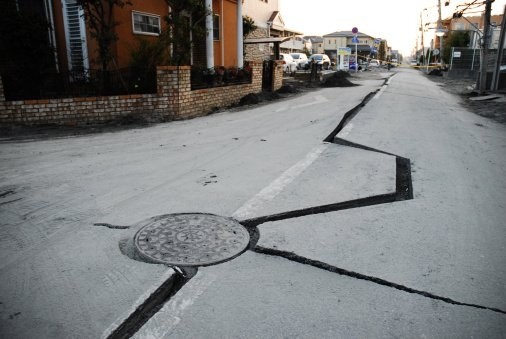How To Protect Yourself During An Earthquake

Surviving an earthquake depends largely upon knowing what to do before, during and after the shaking. Some factors you will have no control over, such as the type of building you may be in, or if you're driving a car. Things you can control will give some peace of mind and, if reviewed every once in awhile, can become second nature.
Anchor heavy furniture and appliances such as China cabinets, tall bookshelves, and water heaters. Make sure you do not hang mirrors or heavy objects above where people sleep or sit.
Locate the safe areas inside your home. Safe areas can be under a strong desk or bed, alongside a sturdy structure, or next to an interior wall. Avoid chimneys, large windows, and any unsecured objects that could fall on you.
Store heavy items lower to the ground. Know where the gas, water and electrical shutoffs are and how to turn them off. Store flammable liquids away from potential ignition sources such as water heaters and stoves.
Have emergency supplies such as bottled water, flashlights, first aid kit, blankets, two weeks worth of food, extra batteries, tools to shut off utilities, and a "go kit" that you can take the items with you if you need to leave the area.
Do not panic and rely on your preparedness.
If indoors, get away from windows, fireplaces or objects that can fall on you. Move quickly to one of the safe areas in your house. Do not try to exit the building. If you are cooking, don't forget to turn off the stove.
When you're in a safe spot, drop to your knees and cover your head and neck with your arms or a pillow.
If outdoors, try to get to an open area away from buildings, power lines, and trees.
If driving, slow down and pull over to the side of the road. Do not stop on bridges, under overpasses, under power lines, or any other structure that could break.
Do not leave the vehicle especially if power lines have fallen on it. You will not get electrocuted unless you step to the ground from your car.
Check for injuries and treat them if life threatening. Ensure the safety of others by moving them from dangerous areas and pointing out hazards.
Check for damage. If your building is badly damaged, take your “go kit” and leave.
If you smell or hear a gas leak, open windows and doors and leave the area. Do not use electrical appliances. Turn off the gas and report it to the utility company and fire department.
If the power is out, unplug all appliances to minimize possible damage when it comes back on.
If you smell burning insulation, see sparks, or notice frayed wires, turn off electricity at the main fuse box or breaker. If you have to step in water to turn off the electricity, call a professional.
- 0kf697b7f3c4f3e652915769c07cc7c742.jpg
Anchor heavy furniture and appliances such as China cabinets, tall bookshelves, and water heaters. Make sure you do not hang mirrors or heavy objects above where people sleep or sit.
Locate the safe areas inside your home. Safe areas can be under a strong desk or bed, alongside a sturdy structure, or next to an interior wall. Avoid chimneys, large windows, and any unsecured objects that could fall on you.
Store heavy items lower to the ground. Know where the gas, water and electrical shutoffs are and how to turn them off. Store flammable liquids away from potential ignition sources such as water heaters and stoves.
Have emergency supplies such as bottled water, flashlights, first aid kit, blankets, two weeks worth of food, extra batteries, tools to shut off utilities, and a "go kit" that you can take the items with you if you need to leave the area.
- uk11baf091e71cebf499d35e58f8b8afc1.jpg
Do not panic and rely on your preparedness.
If indoors, get away from windows, fireplaces or objects that can fall on you. Move quickly to one of the safe areas in your house. Do not try to exit the building. If you are cooking, don't forget to turn off the stove.
When you're in a safe spot, drop to your knees and cover your head and neck with your arms or a pillow.
If outdoors, try to get to an open area away from buildings, power lines, and trees.
If driving, slow down and pull over to the side of the road. Do not stop on bridges, under overpasses, under power lines, or any other structure that could break.
Do not leave the vehicle especially if power lines have fallen on it. You will not get electrocuted unless you step to the ground from your car.
- r26680e476b3f240ddf7a2ca8f3dd2297c.jpg
Check for injuries and treat them if life threatening. Ensure the safety of others by moving them from dangerous areas and pointing out hazards.
Check for damage. If your building is badly damaged, take your “go kit” and leave.
If you smell or hear a gas leak, open windows and doors and leave the area. Do not use electrical appliances. Turn off the gas and report it to the utility company and fire department.
If the power is out, unplug all appliances to minimize possible damage when it comes back on.
If you smell burning insulation, see sparks, or notice frayed wires, turn off electricity at the main fuse box or breaker. If you have to step in water to turn off the electricity, call a professional.
- yu71033345787e7e560e514bc909a9549b.jpg